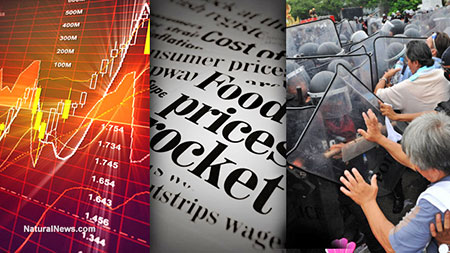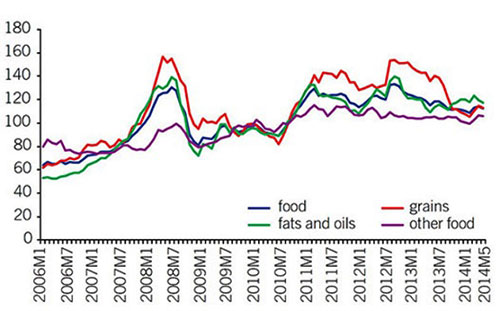
by Mike Adams
May 30, 2014
from
NaturalNews Website

A new report issued by
the World Bank
(1) warns that food prices are skyrocketing globally, with wheat
up 18 percent and corn up 12 percent this quarter.
Ukraine, one of the largest wheat exporters in
the world, has suffered a 73 percent increase in domestic wheat costs.
Argentina has seen wheat prices skyrocket 70 percent.
According to the World Bank, these price increases have been caused
primarily by three factors:
-
Sharply higher demand for food in China
-
U.S. drought conditions that hammered wheat production
-
Unrest in Ukraine due to the near state
of war with Russia
Rising food prices lead to food
riots
According to the World Bank, rising food prices
have caused 51 food riots in 37 countries since 2007.
These include Tunisia, South Africa, Cameroon
and India, among other nations.
"Food price shocks can both spark and
exacerbate conflict and political instability," warns the report.
A World Bank blog entry by Senior Economist
Jose Cuesta entitled "No Food, No Peace" (2) warns
that,
"It is quite likely that we will experience
more food riots in the foreseeable future... food price shocks have
repeatedly led to spontaneous - typically urban - sociopolitical
instability."
The following chart shows from the World Bank
shows the sharp trend toward increased food prices worldwide:

Hunger leads to revolution
What the World Bank is leading to (but not quite
saying) is that hunger leads to revolution.
When the People are starving in the streets,
there is political unrest that can easily turn violent. Because this is a
fundamental human reaction, it is just as true in the United States, UK and
other first-world nations as it is in Cameroon or India.
American investigative journalist Alfred Henry Lewis (1855-1914) famously
said,
"There are only nine meals between mankind and anarchy."
He went on to
explain,
"It may be taken as axiomatic that a starving man is never a good
citizen."
What he means is that hunger dispels the illusions of a polite society
and unleashes the desperate animal-like nature that lurks inside all human
beings.
A starving man trying to feed his starving
children will at some point abandon all law and order, doing anything
necessary to keep himself and his children alive, including engaging in
robbery, assault and murder.
Stated another way, the only reason most people obey laws and agree to live
in a socially polite manner is because their bellies are full. Take
away the food and all illusions of social friendliness vanish in about nine
meals (three days).
No local police force can hope to control the
actions of the starving masses, regardless of how obedient the population
once was when food was abundant.
The coming food collapse is now
inevitable
Many are now warning about the coming collapse
in the food supply.
These warnings include all the following factors:
-
EBT CARDS are
the federal government's "food stamp" system that distributes money
to over 47 million Americans who use that money on debit cards to
buy food.
The
EBT system depends entirely on the
financial solvency of the federal government, an empire steeped in
over $17 trillion in debt and constantly on the verge of a financial
wipeout.
When the day comes that the feds stop
funding the EBT cards,
food riots are imminent. EBT cardholders have already
ransacked a Wal-Mart store, even in good times!
(Once the EBT entitlements are cut off,
EBT card holders will simply ransack the same stores they used to
visit as customers. Once those stores run out of food, U.S. cities
will devolve into all-out street warfare.)
-
HYDROLOGIC CYCLE SCIENTISTS
are warning that much of the food production taking place in the
world today - across the USA, India, China, etc. - depends entirely
on fossil water extraction from underground aquifers.
Those
aquifers (like
the Ogallala Aquifer) are being rapidly depleted, some dropping more than a
foot each year. Once this fossil water is used up, it's gone for
hundreds or thousands of years. Entire breadbasket regions of the
world (such as the U.S. Midwest) will be turned into agricultural
deserts.
Already, much of Texas and Oklahoma is
returning to Dust Bowl conditions.
-
ENVIRONMENTALISTS
warn that
climate change will cause radical weather patterns
(droughts, floods, freezes) that devastate the food supply.
It is undeniable that radical weather
has already caused unprecedented destruction of U.S. food production
over the last 18 months. (The underlying causes of such weather
patterns, however, remain hotly debated.)
-
GENETICALLY MODIFIED CROPS
are genetically vulnerable to disease because they are mono-culture
crops with little genetic diversity.
Nearly all corn grown in the USA, for
example, is
genetically modified corn with a near-identical genetic
makeup. The situation is obviously ripe for precisely the kind of
disease wipeout we're already witnessing with
global banana crops.
-
ECONOMISTS are
warning that the global money supply is on the verge of collapse.
Once it collapses,
banking would go down
with it, destroying the infrastructure that people use to buy food.
If grocery stores can't conduct financial transactions, they can't
buy inventory to retail to the public, for starters.
To stay informed on this subject, read
up at,
-
PERMACULTURE
advocates are warning that the global seed supply has been
deliberately collapsed by biotech companies which routinely buy up
small seed companies and shut them down.
The intention is to create seed
monopolies and eliminate competing alternatives to patented,
corporate-controlled seeds.
The answer to all this, by the way, is
found in the wisdom of people like Geoff Lawton who teaches
decentralized, abundant food production
based on permaculture design science.
(Really, Geoff's wisdom can save our
world if embraced as a replacement for corporate agriculture...)
Temporary illusions of cheap
food will soon be shattered
In other words, there are economic, hydrologic
and genetic reasons why today's abundant food supply will come to an
abrupt end.
The cheap, easy food you buy at the grocery
store right now is a temporary illusion of cheap food based on
unsustainable agricultural practices that use up fossil water, destroy
topsoil and poison the environment.
Even the U.S. government's subsidizing of food through its runaway food
stamp program is a temporary artifact of a nation headed for an inevitable
debt collapse.
Learn more from
www.TrendsResearch.com
It is therefore a mathematical and physical certainty that this illusion of
cheap, plentiful food will soon be shattered. And in its wake, we will be
left with a starving, desperate population with nothing to lose by marching
in the streets or staging a violent revolt.
America has abandoned food
security in favor of corporate monopolies
Everywhere that this happens will see cities
turned into death traps.
Because of the centralized corporate farming
model that now dominates first-world economies, food production (and even
farm land) is controlled by very small number of corporate operations. This
is the opposite of food security.
A nation practicing food security would encourage home gardens
and support decentralized food production that includes urban food
production. Interestingly, nations like Cuba and Russia have encouraged
precisely these practices, which is why they are more resistant to a food
supply collapse.
In the United States, however,
home gardeners have been threatened with arrest.
People who produce real food are often
raided at gunpoint by government authorities.
Farmers who try to produce clean, non-GMO crops are sued by companies like
Monsanto whose seeds pollute their farm land.
Government and corporate entities have colluded in the United States to
monopolize food production, thereby centralizing it in a way that
compromises food security. The day of Americans being told to "plant Victory
Gardens" during World War II are long gone.
Today, we're told to obediently line up and eat
genetically modified soybeans or drink hormone-contaminated cow's milk.
Government now demands our 'food obedience'
and actively works against individuals who try to produce their own food at
the local level.
Why the food supply is America's
tactical vulnerability
This makes America wildly vulnerable to
disruptions in the food supply.
While many nations can manage to get by thanks
to home gardens and decentralize food production, the United States of
America has allowed government and corporations to structure the national
food supply system into a precarious, non-fault-tolerant configuration
that's practically begging for collapse.
Just one disruption in the system - a failed power grid, failed fuel
refineries or a failed financial transaction infrastructure - would collapse
food availability nationwide, sending the population into a near-immediate
state of desperate starvation.
Martial Law would no doubt
quickly follow, after
which Americans would be ordered to starve to death at the hands
of FEMA
instead of starving to death on their own.
On March 16, 2012, Obama
declared federal control over all farms, food, livestock and seeds
The federal government already knows
everything I'm telling you here.
That's why on march 16, 2012, President
Obama issued an executive order entitled, "NATIONAL DEFENSE RESOURCES
PREPAREDNESS."
You can read the official White House press release admitting this
right here.
This executive order states that the President alone has the authority to
take over all resources in the nation (labor, food, industry, etc.) as long
as it is done "to promote the national defense."
The proclamation gives the
Secretary of Agriculture full authority to seize
all,
"food resources, food resource facilities, livestock resources,
veterinary resources, plant health resources, and the domestic distribution
of farm equipment and commercial fertilizer."
The
Secretary of Defense is given control over all "water resources," and
the
Secretary of Commerce is given control over,
"all other materials, services, and
facilities, including construction materials."
The federal government sees what's coming,
in other words, and has already laid claim to all YOUR food, farm land,
livestock, fertilizer and farm equipment, among other food-related assets.
If, after reading this, you aren't double-checking your secret storable food
stockpiles, you're crazy.
Sources
(1)
http://www.worldbank.org/en/topic/poverty/pu...
(2)
http://blogs.worldbank.org/voices/no-food-no...


